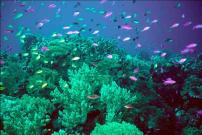 The majority of the world’s coral reefs are in danger of being killed off by rising levels of greenhouse gases, scientists have warned.
The majority of the world’s coral reefs are in danger of being killed off by rising levels of greenhouse gases, scientists have warned.
Researchers from Britain, the US and Australia, working with teams from the UN and the World Bank, voiced their concerns after a study revealed 98% of the world’s reef habitats are likely to become too acidic for corals to grow by 2050.
The loss of big coral reefs would have a devastating effect on communities, many of which rely on fish and other marine life that shelter in the reefs. It would leave coastlines unprotected against storm surges and damage often-crucial income from tourism. Among the first victims of acidifying oceans will be Australia’s Great Barrier Reef, the world’s largest organic structure.
“Before the industrial revolution over 98% of warm water coral reefs were bathed with open ocean waters 3.5 times supersaturated with aragonite, meaning that corals could easily extract it to build reefs,” said Long Cao, a co-author from the Carnegie Institution in Stanford. “If atmospheric carbon dioxide stabilises at 550ppm, and even that would take concerted international effort, no existing coral reef will remain in such an environment.”
